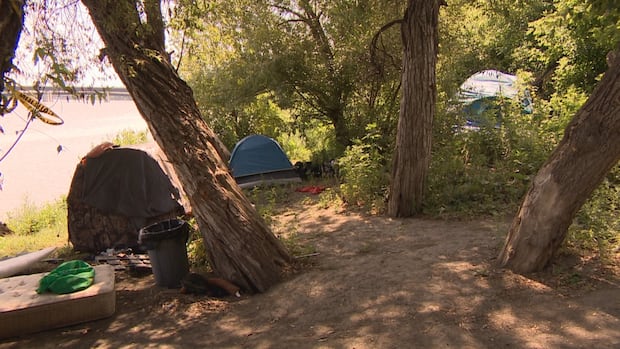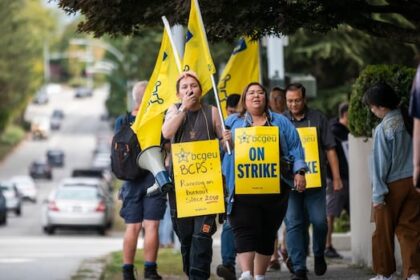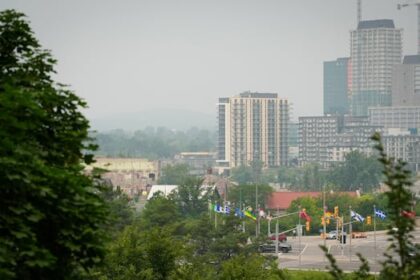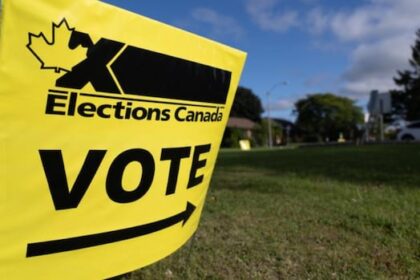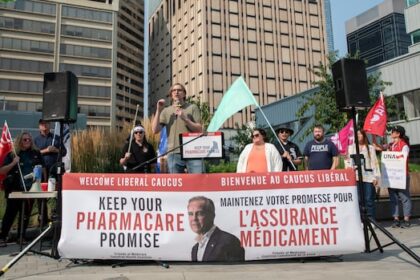ManitobaAs the City of Winnipeg pushes for tighter rules around homeless encampments, one outreach organization is questioning how effective the proposed bylaw would be and whether it’s even legal — but one constitutional law expert thinks it would likely stand up to a challenge.Bylaw that would ban homeless encampments in areas like parks may not meet Charter test: Main Street ProjectMike Arsenault · CBC News · Posted: Sep 11, 2025 6:00 AM EDT | Last Updated: 2 hours agoA July photo shows tents along the Red River in the Point Douglas area of Winnipeg. The executive director of Main Street Project says he understands the frustration people are feeling around encampments, but says implementing a ban in certain parts of the city won’t solve the problem. (Rudi Pawlychyn/CBC)As the City of Winnipeg pushes for tighter rules around homeless encampments, one outreach organization is questioning how effective the proposed bylaw would be and whether it’s even legal — but one constitutional law expert thinks it would likely stand up to a challenge.Winnipeg city council’s community services committee unanimously approved a motion Monday that could ban encampments in certain areas of the city, including near playgrounds, pools, schools or daycares. The motion has to go to council’s executive policy committee before a final vote by council.But the executive director of the Main Street Project outreach organization isn’t sure the bylaw — which would also prohibit encampments on medians or traffic islands, or near transit shelters, bridges or rail lines, among other locations — would be enforceable even if it’s approved.”Our understanding is that governments cannot move people off public lands,” Jamil Mahmood said Wednesday.”Unless you can offer a valid housing [option] to people, [the proposed bylaw] doesn’t meet the kind of Charter of Rights and Freedoms we have in Canada.” Main Street Project executive director Jamil Mahmood says the city should focus on the root causes of homelessness, ‘and not just move it around and create more problems.’ (CBC)Mahmood said he understands the frustration people are feeling around encampments and the challenges they bring, but he maintains the city can’t enforce its way out of problems with poverty and homelessness.The solution to ending homelessness is more affordable housing with wraparound supports, he said.”We should be making motions that address the root causes of homelessness … actual responses that will solve the problem, and not just move it around and create more problems.”He said even though the Main Street Project was recently awarded the City of Winnipeg’s contract to do outreach work with people living in encampments, the city didn’t consult with his organization before the proposed bylaw was introduced. He said he’s open to having consultations with the city about a more proactive strategy.”We’d welcome the opportunity to sit down and co-develop a strategy with the city, the province and community partners to make sure that it’s meeting the needs of everyone, but also make sure the resources are put in the right place.”Would withstand ‘constitutional scrutiny’: law profEric Adams, a University of Alberta law professor who specializes in human rights and constitutional law, said Winnipeg’s proposed bylaw is structured in such a way that it would probably stand up to a constitutional challenge.”We’ve seen a number of municipalities face constitutional challenges with regulations or bylaws that totally prohibit homeless encampments and make them illegal,” said Adams.With its proposed bylaw, Winnipeg “has elected not to totally prohibit shelters, but rather just to zone where they may not occur,” he said.”Doing that will make the argument about exposing people to a risk in violation of their … [Charter] rights play out a little bit differently.”Eric Adams, a professor of law at the University of Alberta, says he thinks the City of Winnipeg would have considered the type of legal challenges other cities have seen when it drafted its proposed bylaw. (CBC)Last month, the Ontario Superior Court ruled in favour of residents in a Kitchener encampment, after the Region of Waterloo passed a site-specific bylaw ordering the encampment cleared.Adams believes the City of Winnipeg was mindful of these kinds of potential legal challenges when it drafted the bylaw.”I can say confidently that the City of Winnipeg has been probably studying the issue carefully, so that they have a bylaw that will stand up to constitutional scrutiny,” said Adams.”That will be [the city’s] goal, and at the end of the day, it’ll be for the courts to decide whether or not it passes muster.”A spokesperson for Mayor Scott Gillingham said the City of Winnipeg’s legal team was consulted when the bylaw was drafted. Criminalizing poverty: advocateBut like Main Street Project’s Mahmoud, Canada’s federal housing advocate doesn’t believe the new rules would be effective.Bylaws like the one Winnipeg is proposing “criminalize poor people and poverty,” said Marie-Josée Houle.”The focus really needs to be on letting people know where they can go, and ensuring that they have the services that they need.”Federal housing advocate Marie-Josée Houle says bylaws like the one Winnipeg is proposing serve to ‘criminalize poor people and poverty.’ (CBC)Forcing people to move their encampments will only lead to more problems, Houle said. She thinks the city needs more adequate housing.”For some people, it’s just a matter of it being affordable.… For others it needs to come with supports to help get a bank account and set up a way to ensure the rent is paid every month, or to learn how to cook and clean.” Houle suggests the city should build trust with the homeless community and work with them to find suitable locations for encampments away from places like schools and daycares.”As opposed to just saying, ‘You can’t be here, and if you’re here again we’re going to get the police’ … put yourself in the shoes of people whose every moment of the day is about survival. They are just trying to make it through the moment.”With files from Alana Cole
Thursday, 5 Feb 2026
Canada – The Illusion
Search
Have an existing account?
Sign In
© 2022 Foxiz News Network. Ruby Design Company. All Rights Reserved.
You May also Like
- More News:
- history
- Standing Bear Network
- John Gonzalez
- ᐊᔭᐦᑊ ayahp — It happened
- Creation
- Beneath the Water
- Olympic gold medal
- Jim Thorpe
- type O blood
- the bringer of life
- Raven
- Wás’agi
- NoiseCat
- 'Sugarcane'
- The rivers still sing
- ᑲᓂᐸᐏᐟ ᒪᐢᑿ
- ᐅᑳᐤ okâw — We remember
- ᐊᓂᓈᐯᐃᐧᐣ aninâpêwin — Truth
- This is what it means to be human.
- Nokoma


